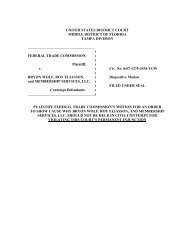Gasoline Price Changes - Federal Trade Commission
Gasoline Price Changes - Federal Trade Commission
Gasoline Price Changes - Federal Trade Commission
Create successful ePaper yourself
Turn your PDF publications into a flip-book with our unique Google optimized e-Paper software.
GASOLINE PRICE CHANGES:<br />
Profitability in the oil industry varies depending on industry segment as well. Crude oil<br />
production accounts for a large portion of the overall profits for FRS firms. In 2003, FRS firms’<br />
net income from crude production was $44 billion out of total petroleum net income of $59<br />
billion. The FRS companies have benefited from higher oil prices caused by the increase in<br />
world demand. As oil prices have increased, their exploration and production operations have<br />
become much more profitable.<br />
In essence, companies with exploration and production operations are in a position<br />
analogous to that of a homeowner who bought a house in a popular area just before increased<br />
demand for housing caused real estate prices to escalate. The homeowner would not expect to<br />
sell the house based on the price paid for it, but rather based on what the house was worth in<br />
today’s market. Similarly, the fact that an oil company could profitably produce its crude oil at<br />
$30 per barrel does not mean that the firm should expect to sell its crude below what increased<br />
demand for crude oil has made it worth in the world market today. 65 Indeed, even if a firm were<br />
inclined to sell at a price based solely on production costs (and not on supply and demand), that<br />
would not reduce crude oil prices. Rather, savvy oil traders would flock to buy the cheaply<br />
offered crude oil and then resell it at the higher market price.<br />
Domestic refining and marketing represents a much smaller source of net profits for the<br />
FRS companies. In 2003, this segment accounted for $7.4 billion in net income, or $0.032 per<br />
gallon of refinery throughput. This was a substantial change from 2002, when refining and<br />
marketing were responsible for $1.4 billion in losses for the FRS companies as a whole. From<br />
the data available so far, the year 2004 appears to have been more profitable than 2003 for<br />
refining and marketing. 66 Based on recent company financial data for the six selected oil<br />
companies, their net income from domestic refining and marketing increased from about $3.8<br />
billion to $8.3 billion between 2003 and 2004, or from $0.032 per gallon of crude oil processed<br />
to $0.064 per gallon of crude oil processed. 67 For these six companies, the increase in net<br />
income from their refining and marketing operations per gallon of refinery throughput was<br />
roughly 10 percent of the $0.28 per gallon increase in retail gasoline prices between 2003 and<br />
2004. 68<br />
In sum, as noted in Chapter 1, high prices may signal profit opportunities that draw<br />
additional resources to where they are needed. Similarly, high profits throughout the oil industry<br />
may signal opportunities for increased investment in exploration and production, as well as in<br />
refining and marketing. In the long run, increased investments may lead to more crude oil<br />
production and refining capacity, which could help ameliorate high prices. Nonetheless, because<br />
opening new crude oil fields or adding new refinery capacity takes years to complete, firms will<br />
base these investment decisions on profit prospects over the life of those investments.<br />
62<br />
FEDERAL TRADE COMMISSION, JUNE 2005
















